Ethics and Evidence-Based Research in Healthcare: An Analysis
VerifiedAdded on 2022/11/26
|9
|2208
|365
Essay
AI Summary
This essay delves into the ethical dimensions of evidence-based practice (EBP) and clinical research within healthcare settings. It explores the limitations of ethical safeguards designed for clinical research when applied to EBP, highlighting issues such as privacy and informed consent. The paper examines two ethical exemplars, including a case study on reducing infections in ICUs, and discusses the ethical controversies surrounding the implementation of Evidence-Based Quality Improvement (EBQI) initiatives. Furthermore, it analyzes ethical principles that may conflict with the concept of patients having an ethical responsibility in improving healthcare, such as the balance between patient autonomy and the benefits of medical interventions. The essay concludes by emphasizing the need for adherence to ethical guidelines while recognizing the importance of patient involvement in healthcare improvement.
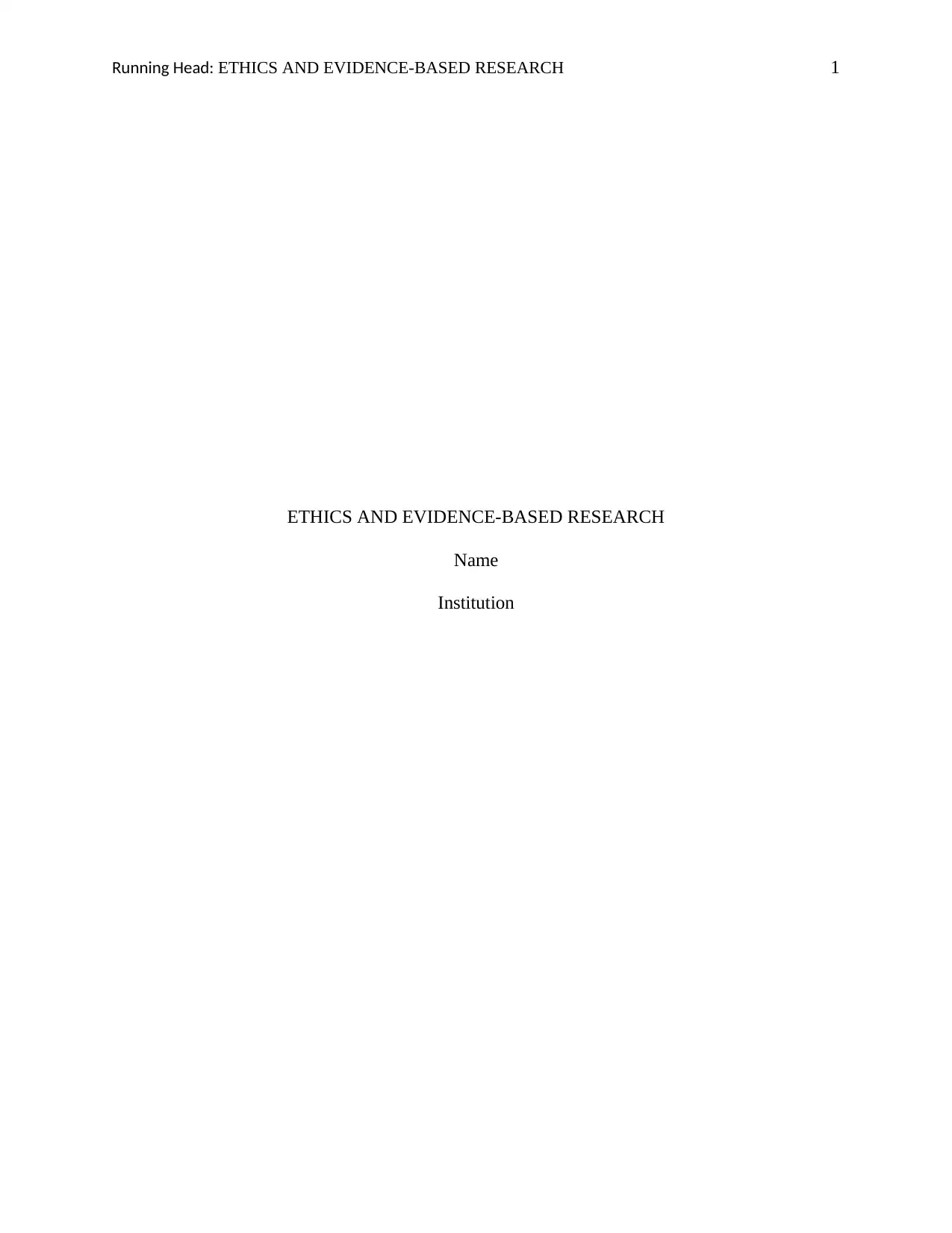
Running Head: ETHICS AND EVIDENCE-BASED RESEARCH 1
ETHICS AND EVIDENCE-BASED RESEARCH
Name
Institution
ETHICS AND EVIDENCE-BASED RESEARCH
Name
Institution
Paraphrase This Document
Need a fresh take? Get an instant paraphrase of this document with our AI Paraphraser
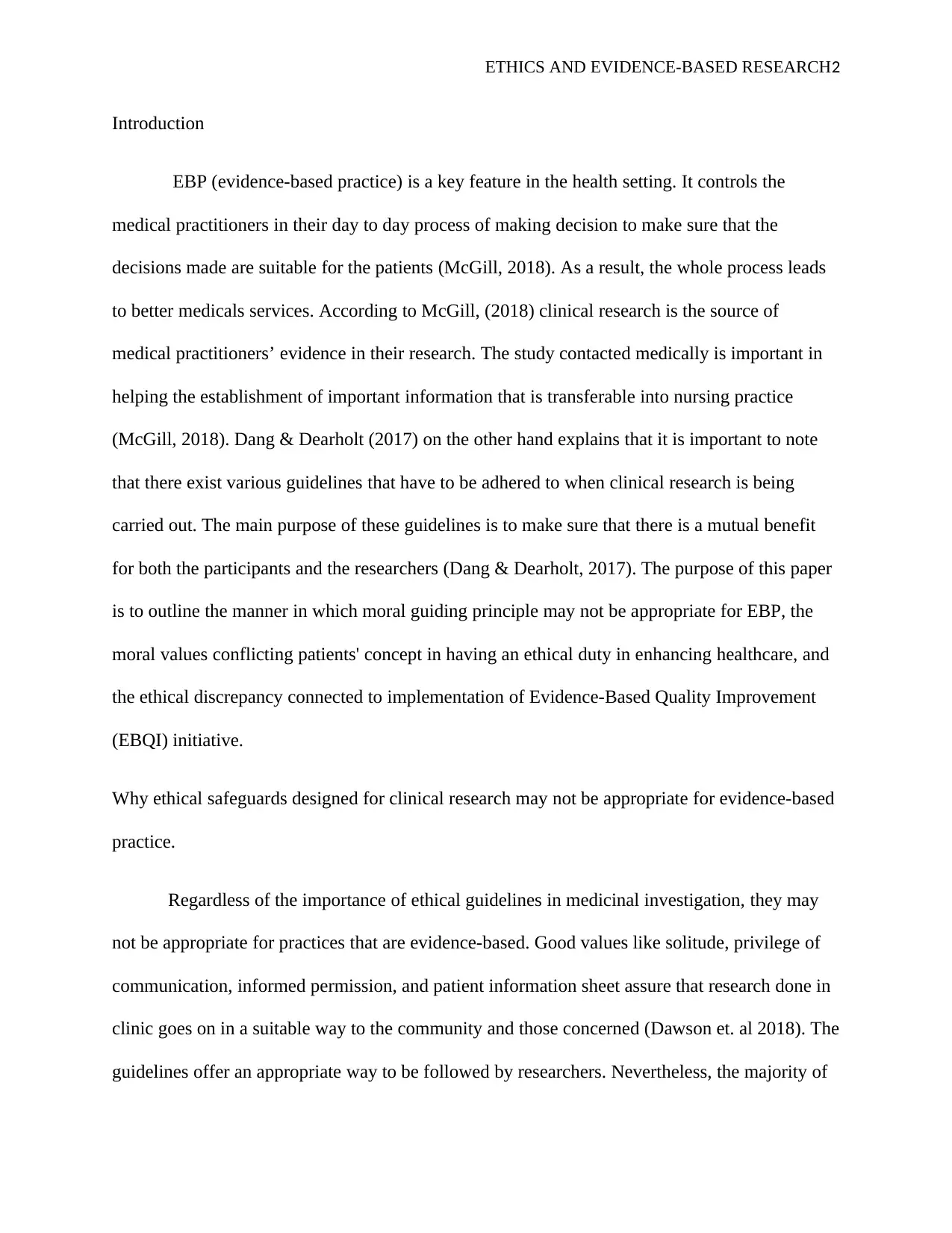
ETHICS AND EVIDENCE-BASED RESEARCH2
Introduction
EBP (evidence-based practice) is a key feature in the health setting. It controls the
medical practitioners in their day to day process of making decision to make sure that the
decisions made are suitable for the patients (McGill, 2018). As a result, the whole process leads
to better medicals services. According to McGill, (2018) clinical research is the source of
medical practitioners’ evidence in their research. The study contacted medically is important in
helping the establishment of important information that is transferable into nursing practice
(McGill, 2018). Dang & Dearholt (2017) on the other hand explains that it is important to note
that there exist various guidelines that have to be adhered to when clinical research is being
carried out. The main purpose of these guidelines is to make sure that there is a mutual benefit
for both the participants and the researchers (Dang & Dearholt, 2017). The purpose of this paper
is to outline the manner in which moral guiding principle may not be appropriate for EBP, the
moral values conflicting patients' concept in having an ethical duty in enhancing healthcare, and
the ethical discrepancy connected to implementation of Evidence-Based Quality Improvement
(EBQI) initiative.
Why ethical safeguards designed for clinical research may not be appropriate for evidence-based
practice.
Regardless of the importance of ethical guidelines in medicinal investigation, they may
not be appropriate for practices that are evidence-based. Good values like solitude, privilege of
communication, informed permission, and patient information sheet assure that research done in
clinic goes on in a suitable way to the community and those concerned (Dawson et. al 2018). The
guidelines offer an appropriate way to be followed by researchers. Nevertheless, the majority of
Introduction
EBP (evidence-based practice) is a key feature in the health setting. It controls the
medical practitioners in their day to day process of making decision to make sure that the
decisions made are suitable for the patients (McGill, 2018). As a result, the whole process leads
to better medicals services. According to McGill, (2018) clinical research is the source of
medical practitioners’ evidence in their research. The study contacted medically is important in
helping the establishment of important information that is transferable into nursing practice
(McGill, 2018). Dang & Dearholt (2017) on the other hand explains that it is important to note
that there exist various guidelines that have to be adhered to when clinical research is being
carried out. The main purpose of these guidelines is to make sure that there is a mutual benefit
for both the participants and the researchers (Dang & Dearholt, 2017). The purpose of this paper
is to outline the manner in which moral guiding principle may not be appropriate for EBP, the
moral values conflicting patients' concept in having an ethical duty in enhancing healthcare, and
the ethical discrepancy connected to implementation of Evidence-Based Quality Improvement
(EBQI) initiative.
Why ethical safeguards designed for clinical research may not be appropriate for evidence-based
practice.
Regardless of the importance of ethical guidelines in medicinal investigation, they may
not be appropriate for practices that are evidence-based. Good values like solitude, privilege of
communication, informed permission, and patient information sheet assure that research done in
clinic goes on in a suitable way to the community and those concerned (Dawson et. al 2018). The
guidelines offer an appropriate way to be followed by researchers. Nevertheless, the majority of
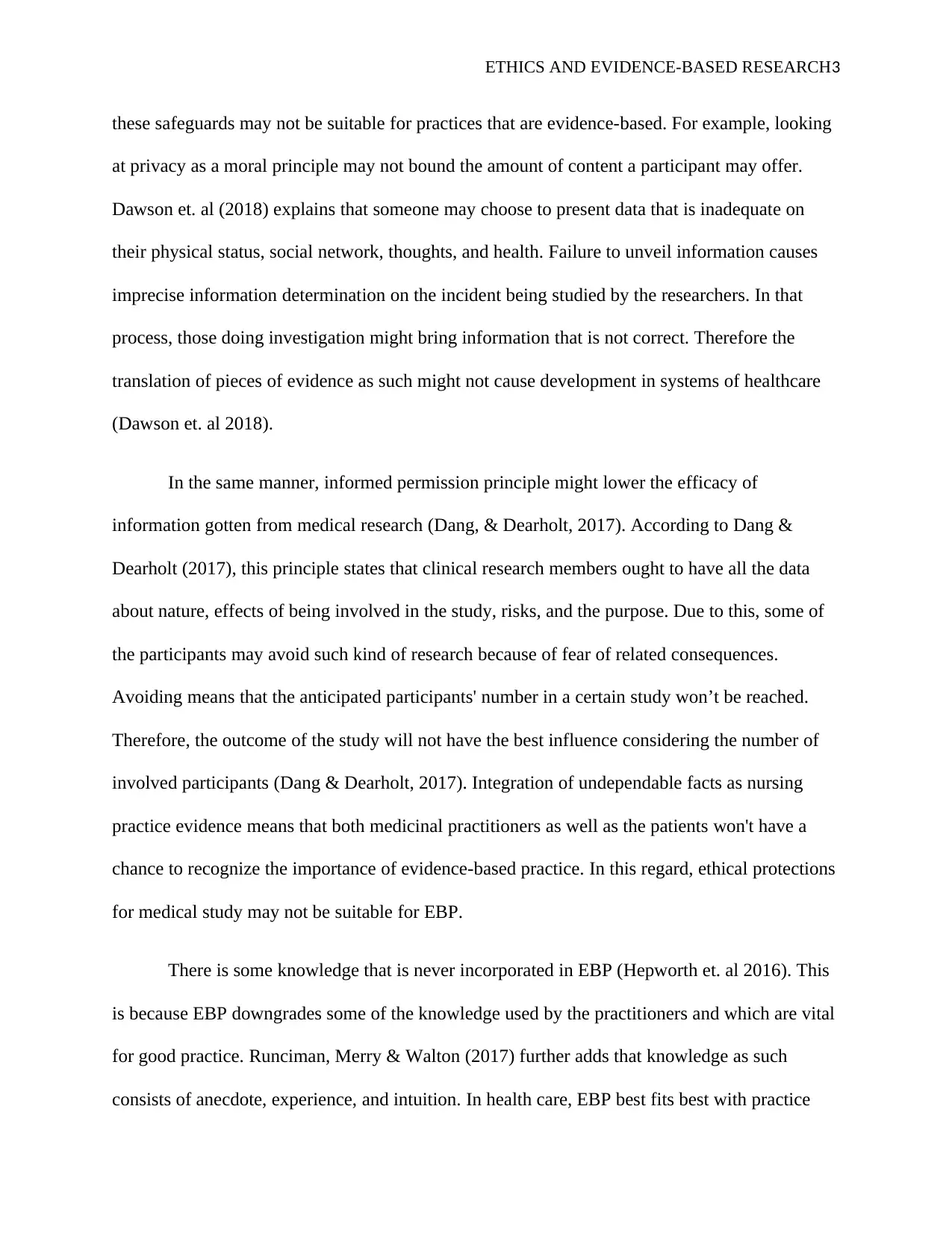
ETHICS AND EVIDENCE-BASED RESEARCH3
these safeguards may not be suitable for practices that are evidence-based. For example, looking
at privacy as a moral principle may not bound the amount of content a participant may offer.
Dawson et. al (2018) explains that someone may choose to present data that is inadequate on
their physical status, social network, thoughts, and health. Failure to unveil information causes
imprecise information determination on the incident being studied by the researchers. In that
process, those doing investigation might bring information that is not correct. Therefore the
translation of pieces of evidence as such might not cause development in systems of healthcare
(Dawson et. al 2018).
In the same manner, informed permission principle might lower the efficacy of
information gotten from medical research (Dang, & Dearholt, 2017). According to Dang &
Dearholt (2017), this principle states that clinical research members ought to have all the data
about nature, effects of being involved in the study, risks, and the purpose. Due to this, some of
the participants may avoid such kind of research because of fear of related consequences.
Avoiding means that the anticipated participants' number in a certain study won’t be reached.
Therefore, the outcome of the study will not have the best influence considering the number of
involved participants (Dang & Dearholt, 2017). Integration of undependable facts as nursing
practice evidence means that both medicinal practitioners as well as the patients won't have a
chance to recognize the importance of evidence-based practice. In this regard, ethical protections
for medical study may not be suitable for EBP.
There is some knowledge that is never incorporated in EBP (Hepworth et. al 2016). This
is because EBP downgrades some of the knowledge used by the practitioners and which are vital
for good practice. Runciman, Merry & Walton (2017) further adds that knowledge as such
consists of anecdote, experience, and intuition. In health care, EBP best fits best with practice
these safeguards may not be suitable for practices that are evidence-based. For example, looking
at privacy as a moral principle may not bound the amount of content a participant may offer.
Dawson et. al (2018) explains that someone may choose to present data that is inadequate on
their physical status, social network, thoughts, and health. Failure to unveil information causes
imprecise information determination on the incident being studied by the researchers. In that
process, those doing investigation might bring information that is not correct. Therefore the
translation of pieces of evidence as such might not cause development in systems of healthcare
(Dawson et. al 2018).
In the same manner, informed permission principle might lower the efficacy of
information gotten from medical research (Dang, & Dearholt, 2017). According to Dang &
Dearholt (2017), this principle states that clinical research members ought to have all the data
about nature, effects of being involved in the study, risks, and the purpose. Due to this, some of
the participants may avoid such kind of research because of fear of related consequences.
Avoiding means that the anticipated participants' number in a certain study won’t be reached.
Therefore, the outcome of the study will not have the best influence considering the number of
involved participants (Dang & Dearholt, 2017). Integration of undependable facts as nursing
practice evidence means that both medicinal practitioners as well as the patients won't have a
chance to recognize the importance of evidence-based practice. In this regard, ethical protections
for medical study may not be suitable for EBP.
There is some knowledge that is never incorporated in EBP (Hepworth et. al 2016). This
is because EBP downgrades some of the knowledge used by the practitioners and which are vital
for good practice. Runciman, Merry & Walton (2017) further adds that knowledge as such
consists of anecdote, experience, and intuition. In health care, EBP best fits best with practice
⊘ This is a preview!⊘
Do you want full access?
Subscribe today to unlock all pages.

Trusted by 1+ million students worldwide
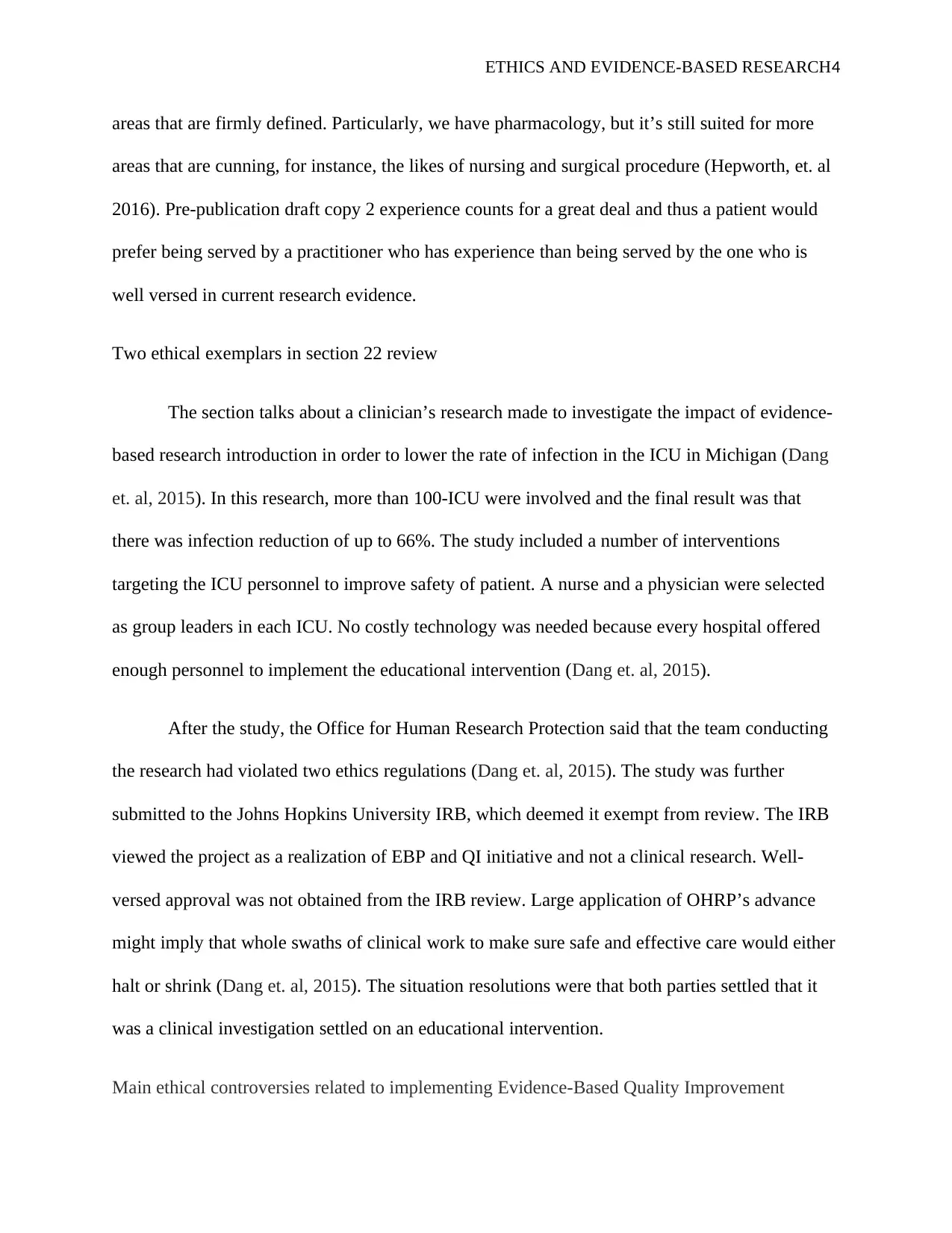
ETHICS AND EVIDENCE-BASED RESEARCH4
areas that are firmly defined. Particularly, we have pharmacology, but it’s still suited for more
areas that are cunning, for instance, the likes of nursing and surgical procedure (Hepworth, et. al
2016). Pre-publication draft copy 2 experience counts for a great deal and thus a patient would
prefer being served by a practitioner who has experience than being served by the one who is
well versed in current research evidence.
Two ethical exemplars in section 22 review
The section talks about a clinician’s research made to investigate the impact of evidence-
based research introduction in order to lower the rate of infection in the ICU in Michigan (Dang
et. al, 2015). In this research, more than 100-ICU were involved and the final result was that
there was infection reduction of up to 66%. The study included a number of interventions
targeting the ICU personnel to improve safety of patient. A nurse and a physician were selected
as group leaders in each ICU. No costly technology was needed because every hospital offered
enough personnel to implement the educational intervention (Dang et. al, 2015).
After the study, the Office for Human Research Protection said that the team conducting
the research had violated two ethics regulations (Dang et. al, 2015). The study was further
submitted to the Johns Hopkins University IRB, which deemed it exempt from review. The IRB
viewed the project as a realization of EBP and QI initiative and not a clinical research. Well-
versed approval was not obtained from the IRB review. Large application of OHRP’s advance
might imply that whole swaths of clinical work to make sure safe and effective care would either
halt or shrink (Dang et. al, 2015). The situation resolutions were that both parties settled that it
was a clinical investigation settled on an educational intervention.
Main ethical controversies related to implementing Evidence-Based Quality Improvement
areas that are firmly defined. Particularly, we have pharmacology, but it’s still suited for more
areas that are cunning, for instance, the likes of nursing and surgical procedure (Hepworth, et. al
2016). Pre-publication draft copy 2 experience counts for a great deal and thus a patient would
prefer being served by a practitioner who has experience than being served by the one who is
well versed in current research evidence.
Two ethical exemplars in section 22 review
The section talks about a clinician’s research made to investigate the impact of evidence-
based research introduction in order to lower the rate of infection in the ICU in Michigan (Dang
et. al, 2015). In this research, more than 100-ICU were involved and the final result was that
there was infection reduction of up to 66%. The study included a number of interventions
targeting the ICU personnel to improve safety of patient. A nurse and a physician were selected
as group leaders in each ICU. No costly technology was needed because every hospital offered
enough personnel to implement the educational intervention (Dang et. al, 2015).
After the study, the Office for Human Research Protection said that the team conducting
the research had violated two ethics regulations (Dang et. al, 2015). The study was further
submitted to the Johns Hopkins University IRB, which deemed it exempt from review. The IRB
viewed the project as a realization of EBP and QI initiative and not a clinical research. Well-
versed approval was not obtained from the IRB review. Large application of OHRP’s advance
might imply that whole swaths of clinical work to make sure safe and effective care would either
halt or shrink (Dang et. al, 2015). The situation resolutions were that both parties settled that it
was a clinical investigation settled on an educational intervention.
Main ethical controversies related to implementing Evidence-Based Quality Improvement
Paraphrase This Document
Need a fresh take? Get an instant paraphrase of this document with our AI Paraphraser
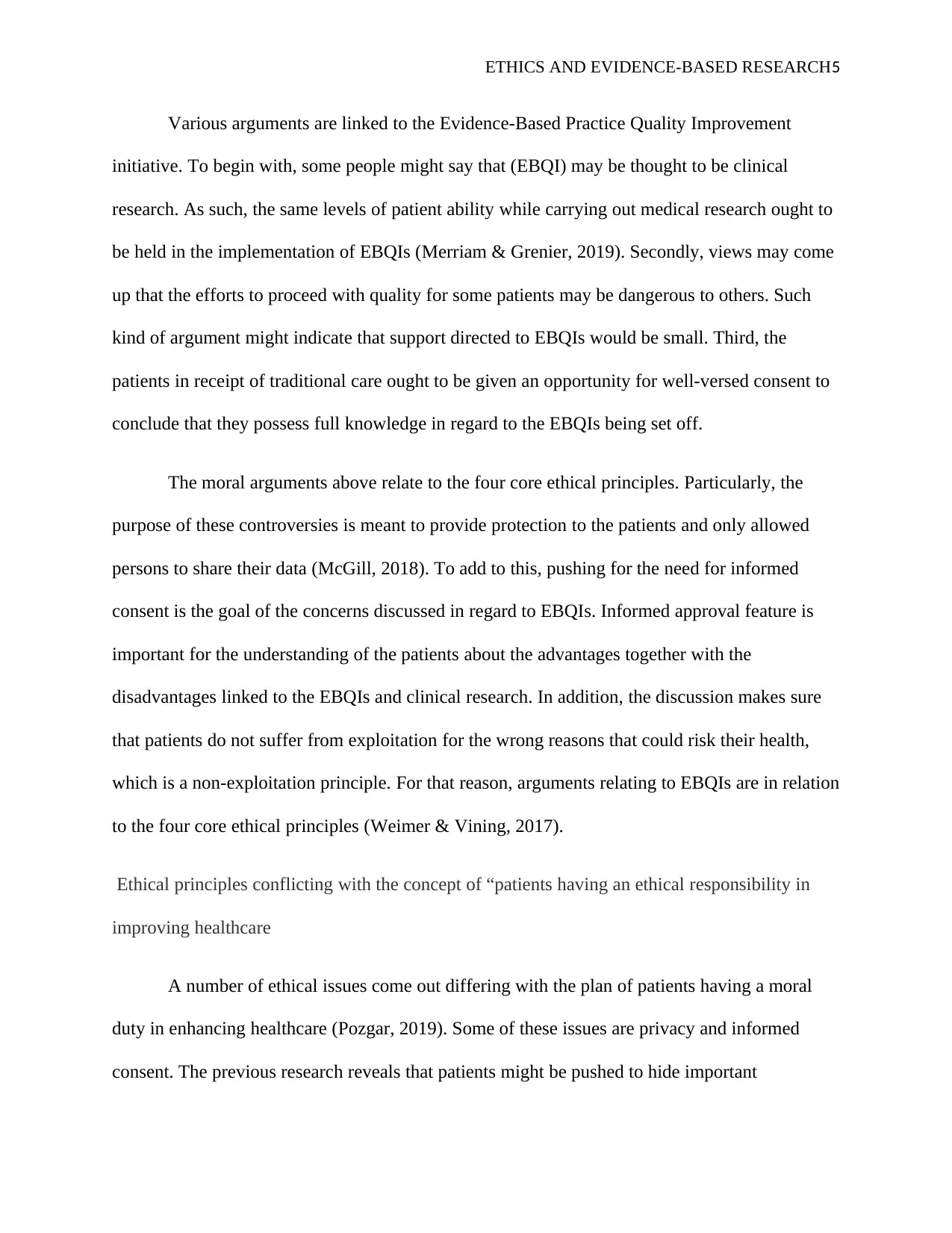
ETHICS AND EVIDENCE-BASED RESEARCH5
Various arguments are linked to the Evidence-Based Practice Quality Improvement
initiative. To begin with, some people might say that (EBQI) may be thought to be clinical
research. As such, the same levels of patient ability while carrying out medical research ought to
be held in the implementation of EBQIs (Merriam & Grenier, 2019). Secondly, views may come
up that the efforts to proceed with quality for some patients may be dangerous to others. Such
kind of argument might indicate that support directed to EBQIs would be small. Third, the
patients in receipt of traditional care ought to be given an opportunity for well-versed consent to
conclude that they possess full knowledge in regard to the EBQIs being set off.
The moral arguments above relate to the four core ethical principles. Particularly, the
purpose of these controversies is meant to provide protection to the patients and only allowed
persons to share their data (McGill, 2018). To add to this, pushing for the need for informed
consent is the goal of the concerns discussed in regard to EBQIs. Informed approval feature is
important for the understanding of the patients about the advantages together with the
disadvantages linked to the EBQIs and clinical research. In addition, the discussion makes sure
that patients do not suffer from exploitation for the wrong reasons that could risk their health,
which is a non-exploitation principle. For that reason, arguments relating to EBQIs are in relation
to the four core ethical principles (Weimer & Vining, 2017).
Ethical principles conflicting with the concept of “patients having an ethical responsibility in
improving healthcare
A number of ethical issues come out differing with the plan of patients having a moral
duty in enhancing healthcare (Pozgar, 2019). Some of these issues are privacy and informed
consent. The previous research reveals that patients might be pushed to hide important
Various arguments are linked to the Evidence-Based Practice Quality Improvement
initiative. To begin with, some people might say that (EBQI) may be thought to be clinical
research. As such, the same levels of patient ability while carrying out medical research ought to
be held in the implementation of EBQIs (Merriam & Grenier, 2019). Secondly, views may come
up that the efforts to proceed with quality for some patients may be dangerous to others. Such
kind of argument might indicate that support directed to EBQIs would be small. Third, the
patients in receipt of traditional care ought to be given an opportunity for well-versed consent to
conclude that they possess full knowledge in regard to the EBQIs being set off.
The moral arguments above relate to the four core ethical principles. Particularly, the
purpose of these controversies is meant to provide protection to the patients and only allowed
persons to share their data (McGill, 2018). To add to this, pushing for the need for informed
consent is the goal of the concerns discussed in regard to EBQIs. Informed approval feature is
important for the understanding of the patients about the advantages together with the
disadvantages linked to the EBQIs and clinical research. In addition, the discussion makes sure
that patients do not suffer from exploitation for the wrong reasons that could risk their health,
which is a non-exploitation principle. For that reason, arguments relating to EBQIs are in relation
to the four core ethical principles (Weimer & Vining, 2017).
Ethical principles conflicting with the concept of “patients having an ethical responsibility in
improving healthcare
A number of ethical issues come out differing with the plan of patients having a moral
duty in enhancing healthcare (Pozgar, 2019). Some of these issues are privacy and informed
consent. The previous research reveals that patients might be pushed to hide important
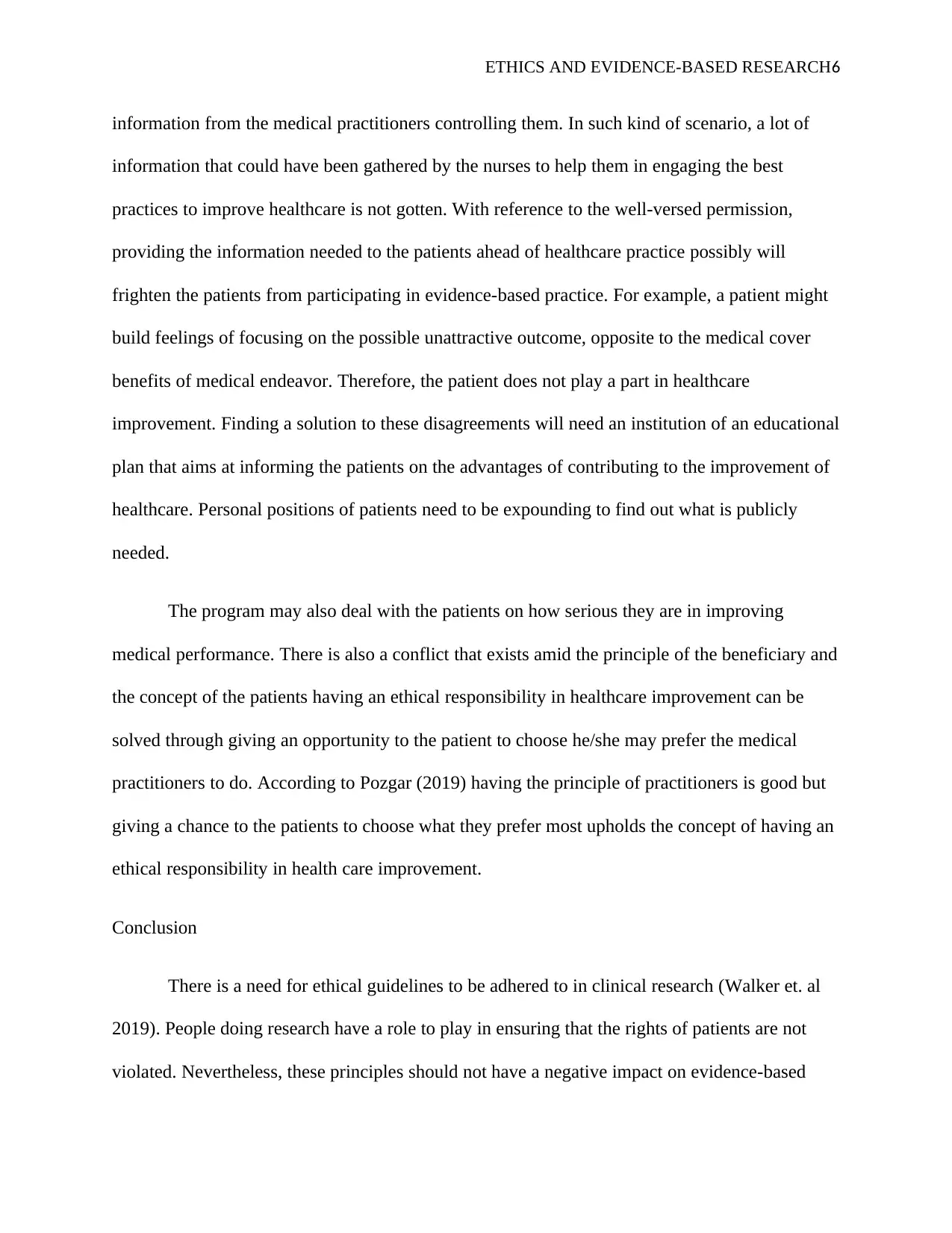
ETHICS AND EVIDENCE-BASED RESEARCH6
information from the medical practitioners controlling them. In such kind of scenario, a lot of
information that could have been gathered by the nurses to help them in engaging the best
practices to improve healthcare is not gotten. With reference to the well-versed permission,
providing the information needed to the patients ahead of healthcare practice possibly will
frighten the patients from participating in evidence-based practice. For example, a patient might
build feelings of focusing on the possible unattractive outcome, opposite to the medical cover
benefits of medical endeavor. Therefore, the patient does not play a part in healthcare
improvement. Finding a solution to these disagreements will need an institution of an educational
plan that aims at informing the patients on the advantages of contributing to the improvement of
healthcare. Personal positions of patients need to be expounding to find out what is publicly
needed.
The program may also deal with the patients on how serious they are in improving
medical performance. There is also a conflict that exists amid the principle of the beneficiary and
the concept of the patients having an ethical responsibility in healthcare improvement can be
solved through giving an opportunity to the patient to choose he/she may prefer the medical
practitioners to do. According to Pozgar (2019) having the principle of practitioners is good but
giving a chance to the patients to choose what they prefer most upholds the concept of having an
ethical responsibility in health care improvement.
Conclusion
There is a need for ethical guidelines to be adhered to in clinical research (Walker et. al
2019). People doing research have a role to play in ensuring that the rights of patients are not
violated. Nevertheless, these principles should not have a negative impact on evidence-based
information from the medical practitioners controlling them. In such kind of scenario, a lot of
information that could have been gathered by the nurses to help them in engaging the best
practices to improve healthcare is not gotten. With reference to the well-versed permission,
providing the information needed to the patients ahead of healthcare practice possibly will
frighten the patients from participating in evidence-based practice. For example, a patient might
build feelings of focusing on the possible unattractive outcome, opposite to the medical cover
benefits of medical endeavor. Therefore, the patient does not play a part in healthcare
improvement. Finding a solution to these disagreements will need an institution of an educational
plan that aims at informing the patients on the advantages of contributing to the improvement of
healthcare. Personal positions of patients need to be expounding to find out what is publicly
needed.
The program may also deal with the patients on how serious they are in improving
medical performance. There is also a conflict that exists amid the principle of the beneficiary and
the concept of the patients having an ethical responsibility in healthcare improvement can be
solved through giving an opportunity to the patient to choose he/she may prefer the medical
practitioners to do. According to Pozgar (2019) having the principle of practitioners is good but
giving a chance to the patients to choose what they prefer most upholds the concept of having an
ethical responsibility in health care improvement.
Conclusion
There is a need for ethical guidelines to be adhered to in clinical research (Walker et. al
2019). People doing research have a role to play in ensuring that the rights of patients are not
violated. Nevertheless, these principles should not have a negative impact on evidence-based
⊘ This is a preview!⊘
Do you want full access?
Subscribe today to unlock all pages.

Trusted by 1+ million students worldwide
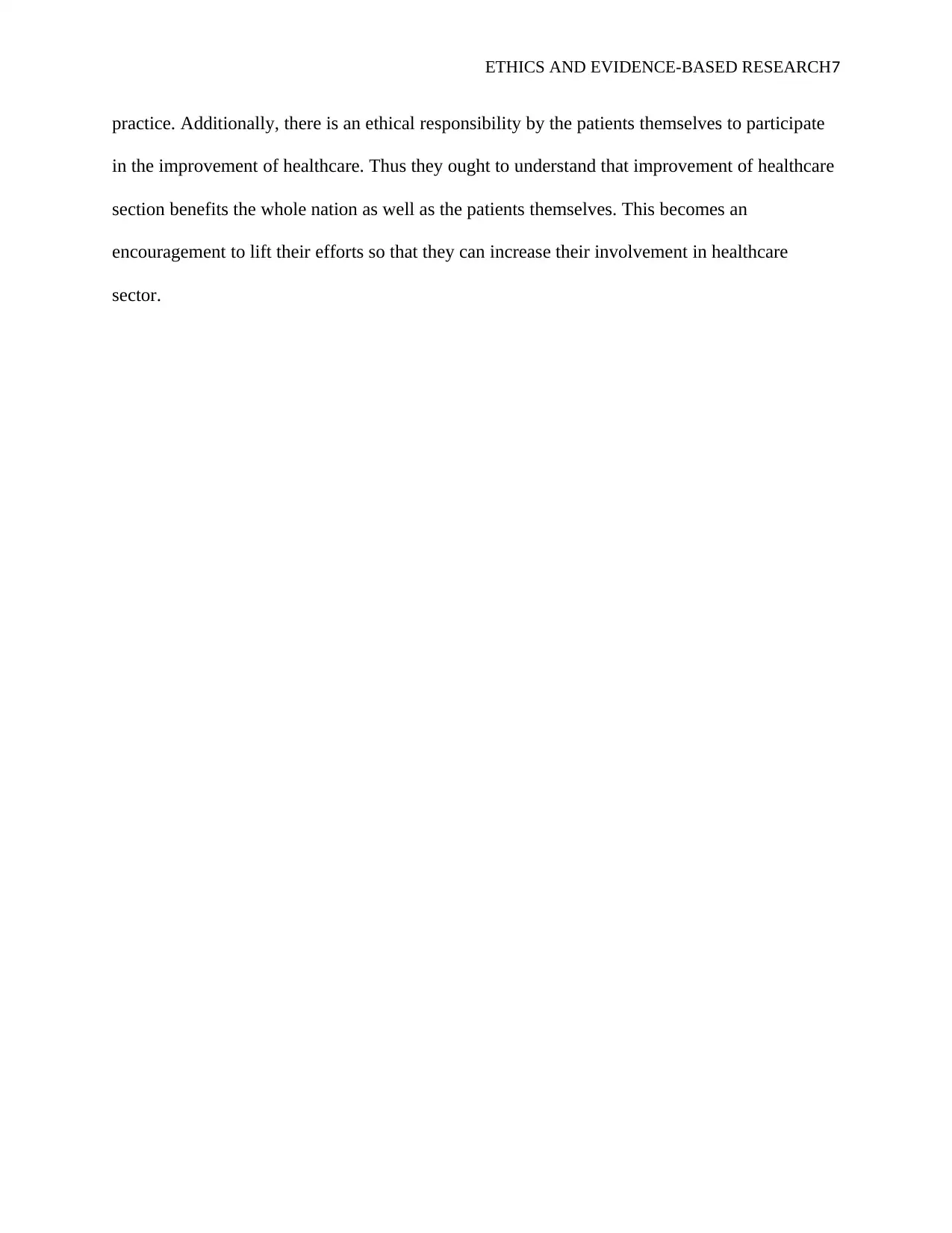
ETHICS AND EVIDENCE-BASED RESEARCH7
practice. Additionally, there is an ethical responsibility by the patients themselves to participate
in the improvement of healthcare. Thus they ought to understand that improvement of healthcare
section benefits the whole nation as well as the patients themselves. This becomes an
encouragement to lift their efforts so that they can increase their involvement in healthcare
sector.
practice. Additionally, there is an ethical responsibility by the patients themselves to participate
in the improvement of healthcare. Thus they ought to understand that improvement of healthcare
section benefits the whole nation as well as the patients themselves. This becomes an
encouragement to lift their efforts so that they can increase their involvement in healthcare
sector.
Paraphrase This Document
Need a fresh take? Get an instant paraphrase of this document with our AI Paraphraser
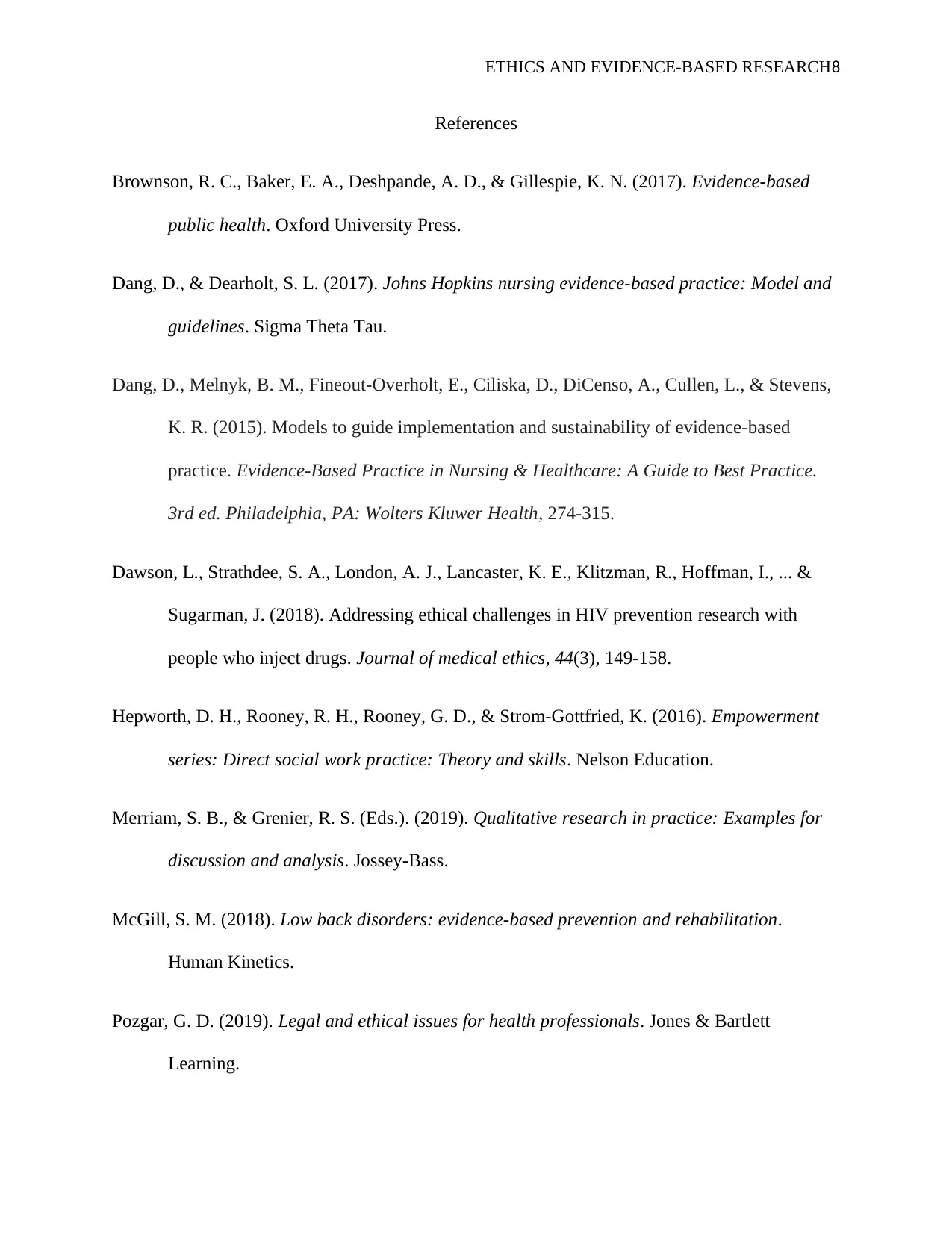
ETHICS AND EVIDENCE-BASED RESEARCH8
References
Brownson, R. C., Baker, E. A., Deshpande, A. D., & Gillespie, K. N. (2017). Evidence-based
public health. Oxford University Press.
Dang, D., & Dearholt, S. L. (2017). Johns Hopkins nursing evidence-based practice: Model and
guidelines. Sigma Theta Tau.
Dang, D., Melnyk, B. M., Fineout-Overholt, E., Ciliska, D., DiCenso, A., Cullen, L., & Stevens,
K. R. (2015). Models to guide implementation and sustainability of evidence-based
practice. Evidence-Based Practice in Nursing & Healthcare: A Guide to Best Practice.
3rd ed. Philadelphia, PA: Wolters Kluwer Health, 274-315.
Dawson, L., Strathdee, S. A., London, A. J., Lancaster, K. E., Klitzman, R., Hoffman, I., ... &
Sugarman, J. (2018). Addressing ethical challenges in HIV prevention research with
people who inject drugs. Journal of medical ethics, 44(3), 149-158.
Hepworth, D. H., Rooney, R. H., Rooney, G. D., & Strom-Gottfried, K. (2016). Empowerment
series: Direct social work practice: Theory and skills. Nelson Education.
Merriam, S. B., & Grenier, R. S. (Eds.). (2019). Qualitative research in practice: Examples for
discussion and analysis. Jossey-Bass.
McGill, S. M. (2018). Low back disorders: evidence-based prevention and rehabilitation.
Human Kinetics.
Pozgar, G. D. (2019). Legal and ethical issues for health professionals. Jones & Bartlett
Learning.
References
Brownson, R. C., Baker, E. A., Deshpande, A. D., & Gillespie, K. N. (2017). Evidence-based
public health. Oxford University Press.
Dang, D., & Dearholt, S. L. (2017). Johns Hopkins nursing evidence-based practice: Model and
guidelines. Sigma Theta Tau.
Dang, D., Melnyk, B. M., Fineout-Overholt, E., Ciliska, D., DiCenso, A., Cullen, L., & Stevens,
K. R. (2015). Models to guide implementation and sustainability of evidence-based
practice. Evidence-Based Practice in Nursing & Healthcare: A Guide to Best Practice.
3rd ed. Philadelphia, PA: Wolters Kluwer Health, 274-315.
Dawson, L., Strathdee, S. A., London, A. J., Lancaster, K. E., Klitzman, R., Hoffman, I., ... &
Sugarman, J. (2018). Addressing ethical challenges in HIV prevention research with
people who inject drugs. Journal of medical ethics, 44(3), 149-158.
Hepworth, D. H., Rooney, R. H., Rooney, G. D., & Strom-Gottfried, K. (2016). Empowerment
series: Direct social work practice: Theory and skills. Nelson Education.
Merriam, S. B., & Grenier, R. S. (Eds.). (2019). Qualitative research in practice: Examples for
discussion and analysis. Jossey-Bass.
McGill, S. M. (2018). Low back disorders: evidence-based prevention and rehabilitation.
Human Kinetics.
Pozgar, G. D. (2019). Legal and ethical issues for health professionals. Jones & Bartlett
Learning.
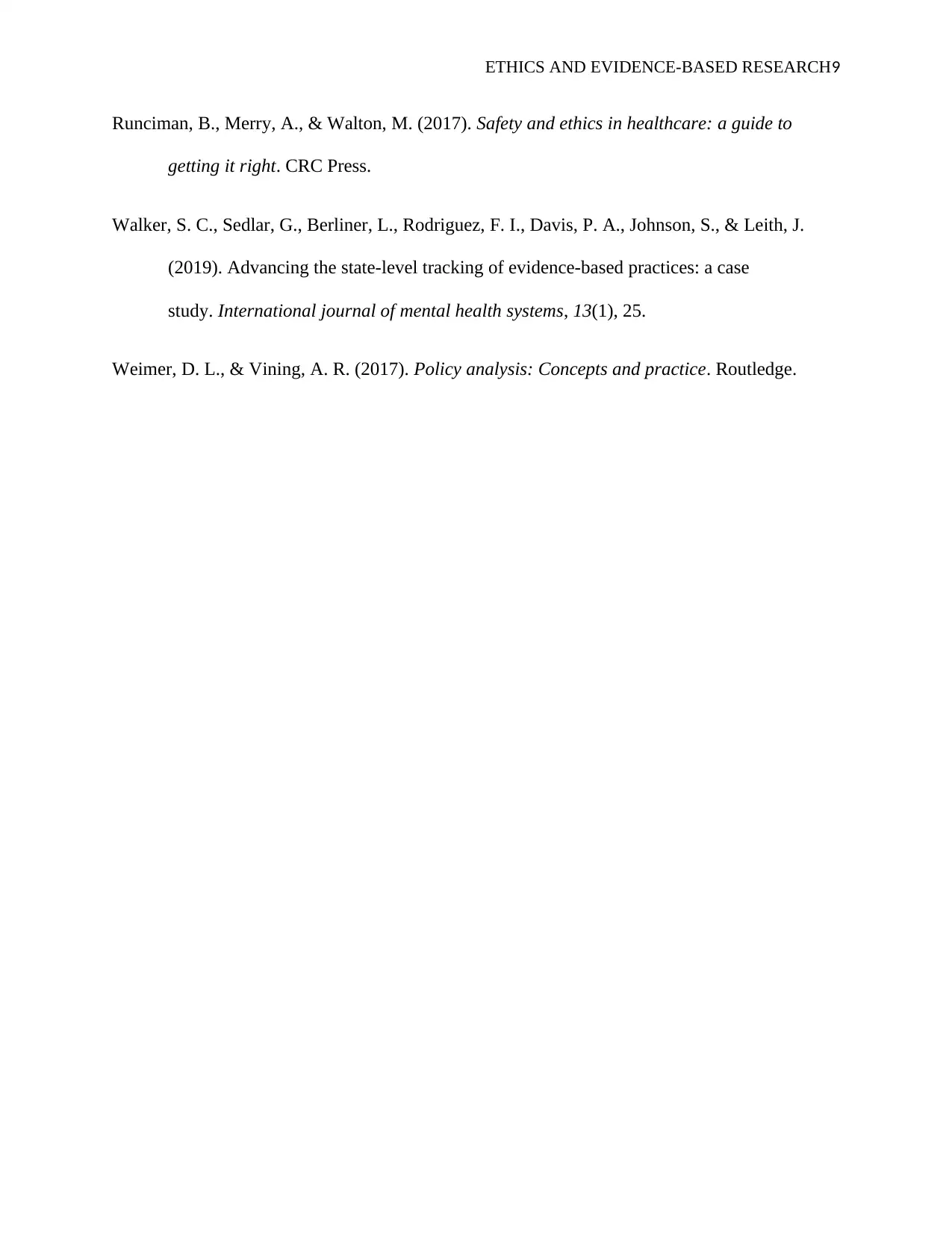
ETHICS AND EVIDENCE-BASED RESEARCH9
Runciman, B., Merry, A., & Walton, M. (2017). Safety and ethics in healthcare: a guide to
getting it right. CRC Press.
Walker, S. C., Sedlar, G., Berliner, L., Rodriguez, F. I., Davis, P. A., Johnson, S., & Leith, J.
(2019). Advancing the state-level tracking of evidence-based practices: a case
study. International journal of mental health systems, 13(1), 25.
Weimer, D. L., & Vining, A. R. (2017). Policy analysis: Concepts and practice. Routledge.
Runciman, B., Merry, A., & Walton, M. (2017). Safety and ethics in healthcare: a guide to
getting it right. CRC Press.
Walker, S. C., Sedlar, G., Berliner, L., Rodriguez, F. I., Davis, P. A., Johnson, S., & Leith, J.
(2019). Advancing the state-level tracking of evidence-based practices: a case
study. International journal of mental health systems, 13(1), 25.
Weimer, D. L., & Vining, A. R. (2017). Policy analysis: Concepts and practice. Routledge.
⊘ This is a preview!⊘
Do you want full access?
Subscribe today to unlock all pages.

Trusted by 1+ million students worldwide
1 out of 9
Related Documents
Your All-in-One AI-Powered Toolkit for Academic Success.
+13062052269
info@desklib.com
Available 24*7 on WhatsApp / Email
![[object Object]](/_next/static/media/star-bottom.7253800d.svg)
Unlock your academic potential
Copyright © 2020–2026 A2Z Services. All Rights Reserved. Developed and managed by ZUCOL.





